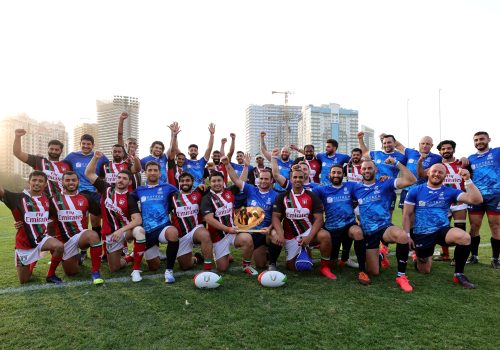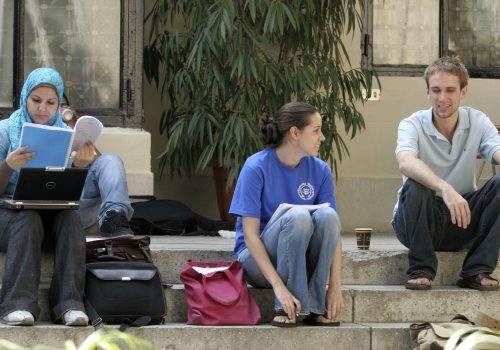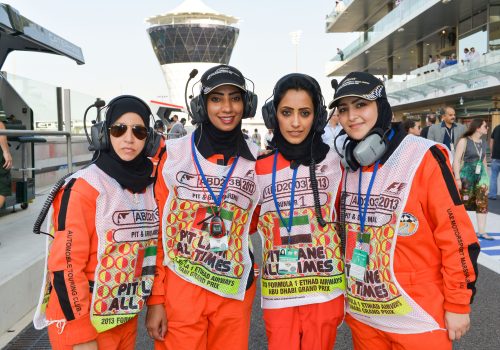Rehumanizing the dehumanized: Rethinking People-to-People exchanges in MENA
People-to-people (P2P) exchanges have long been recognized as a crucial tool in promoting peace and resolving conflicts. In the Israeli-Palestinian context, P2P initiatives gained popularity in the 1990s, but still face significant challenges in bringing about meaningful change in relations between the two peoples. Despite this, the potential for P2P exchanges to foster understanding and cooperation on a regional level remains untapped.
This piece lays out the P2P approach of the “Youth for the Middle East & North Africa” (Y4MENA) initiative, a budding network of partners who seek to use P2P exchanges to build more inclusive, resilient, and sustainable societies. Founded by NOAL (the General Federation of Working and Studying Youth)—Israel’s largest Jewish-Arab youth organization—and Dror Israel—NOAL’s alumni network of young leaders working towards a more just and inclusive Israel—the Y4MENA network seeks to unite like-minded organizations from the entire region, create physical and virtual exchanges between youth and young adults from various Middle East and North Africa (MENA) countries, and build bridges based on topics of strategic significance to our societies.
Before addressing Y4MENA’s operations, it is important to address the problem of dehumanization in the region in order to contextualize NOAL-Dror Israel’s educational approach.
The challenge of rehumanization
Israel and its neighbors in the Arab and Muslim world have undergone a multi-generation process of mutual dehumanization. The Arab world’s political and intellectual elites have portrayed Israel and Jews as foreign agents of European colonialism and used anti-Semitic propaganda to foster hate among their populations. In turn, Israel’s Jewish majority has cut itself off from the Arab and Muslim world, preferring to define itself as a “Western” country, neglecting to learn Arabic, and generally living in ignorance of the rich cultural value of its neighbors.
The result is one in which the other is thoroughly dehumanized and viewed through simplistic stereotypes without a deeper understanding of its societies, lived experiences, and internal struggles. Even in countries with which Israel has enjoyed decades-long peace agreements—namely Egypt and Jordan—Adolf Hitler’s Mein Kampf is widely sold, while Israelis—in the off chance that they do visit the Sinai in Egypt or Petra in Jordan—try to avoid interacting with the local population.
As a result, the fundamental challenge civil society leaders face is rehumanization. In other words, experiencing the “other” as an individual and as a society—as a rich tapestry of stories, dilemmas, and dreams with whom individuals can empathize even if they disagree.
While far from perfect, here is where the 2020 Abraham Accords (a series of joint normalization accords that have been established between Israel and the United Arab Emirates, Bahrain, Morocco, and Sudan) represent a unique strategic opportunity for educators, government officials, and civil society leaders to begin the process of rehumanization within and between these respective societies. Rehumanization has the potential not only to deepen the peace between different countries, but also to strengthen each country internally, for societies that base their self-identity on a dehumanized version of the other are rarely effective at confronting their internal challenges.
Rehumanization has a few key components. The first step is building commonality. P2P leaders must foster friendships, which includes highlighting and strengthening shared values between people. They must show that people already share parts of their lived experiences despite being from different societies.
In Y4MENA’s Israel-Moroccan youth exchange, which took place in the last quarter of 2022, a thirty-person group—which included mostly Moroccan and Israelis and some Arab Israelis—underwent joint training in Rabat and then in Jerusalem, diving into the story of Moroccan Jewry and Arab and Druze communities in Israel. These experiences complicated simplified notions of what Moroccan and Israeli identities are. They mixed beauty and heartbreak, and highlighted the overlaps that exist historically and currently between these peoples, nations, and religions.
Second, fundamental issues must be confronted from a place of common values. Arab educators need to learn about the Holocaust and anti-Semitism to rehumanize Israelis and challenge their own societies. Visiting Israel and learning about the holocaust—whether in Germany or Poland or at Yad Vashem Museum in Jerusalem—are uncomfortable but key steps that must send ripples through MENA societies. As Holocaust historian Yehuda Bauer has taught, anti-Semitism not only destroys Jewish life, it destroys the fabric of the society that adopts it as a coping mechanism.
Similarly, Israeli Jews must explore colonialism and Islamophobia to understand the experience of MENA people. This confrontation needs to be constructive and inviting rather than divisive.
Real impact: Building a regional educational exchange network
To make rehumanization a game changer rather than just a beautiful idea, a network of like-minded institutions must be built across all possible countries, rather than just train individuals. NGOs, schools, religious centers, universities, and governmental bodies have the longevity, vision, and potential for growth that individuals—however talented—simply cannot reach.
Y4MENA seeks out organizational and institutional partners that share its vision of a more positive, tolerant, and sustainable future for all the nations and religions in the region. The group meets at conferences or online, forms partnerships, and discusses concrete collaboration. From there, it does small-scale senior leadership exchanges to test the waters, build larger-scale exchanges, and find the governmental and philanthropic partners to make real collaboration possible.
The ultimate goal of Y4MENA is to establish a network that can serve as a foundation for similar initiatives like the Erasmus program, which has contributed to the stability of the European Union, or Birthright Israel, which has been successful in strengthening the connections between Israel and Diaspora Jewry.
In the coming year, Y4MENA is expected to bring together a few hundred youths from the MENA region. Each graduate will bring their experiences to ten to twenty peers, family members, and/or community leaders, thus, amplifying the program’s reach. But to generate a significant impact—one that will succeed in making a difference among the millions of youths living in the region—it must ultimately reach tens of thousands of direct participants and hundreds of thousands of beneficiaries. This type of sustained growth is only possible through a network of like-minded institutions.
New horizons
Y4MENA has directly operated in four MENA countries—Morocco, Jordan, Egypt, and the Palestinian territories—and is currently building partnerships in five more.
To be truly effective, Y4MENA need to look at where others had difficulties—or didn’t venture—to open more possibilities.
On the Israeli end, this means incorporating groups—Mizrahi, Russian, and Ethiopian Jews—generally left out of Israel’s traditional peace camp, and bringing a proud Israeli, Jewish, and Zionist narrative to encounter. It also means being willing to confront the Palestinian issue and building relationships with Palestinian partners. The P2P community must proudly and boldly step into the shoes of their neighbors. It must also focus on organizations with deep grassroots connections among both the Jewish and Arab publics in Israel (this experience is invaluable in cross-border P2P work).
Together as countries living in the MENA region, its people must confront climate change, extremism, and the despair faced by youth across the region. These are common issues that create the potential for cooperation based on shared needs—a key element in rehumanization.
This model is in its infancy and it does not present a perfect roadmap for rehumanization between regional societies. The Y4MENA project does, however, offer new avenues to tackle this challenge with both depth and breadth.
Tom Vizel is the Executive Director of Y4MENA and the Head of the Educational Department at NOAL.
George Stevens serves as the Director of Operations Y4MENA and Finance Manager at NOAL.
Further reading
Thu, Jan 26, 2023
People-to-people exchanges matter. They’re integral to nurturing the Abraham Accords.
MENASource By Richard LeBaron
This piece identifies some of the issues involved in creating a strong framework for a vital “Abraham Exchanges” program and proposes a few ideas on how to get it off the ground.
Fri, Dec 4, 2020
Biden administration should act fast to bolster people-to-people exchanges with the Middle East
MENASource By
While US policy toward individual MENA countries will be hammered out in the interagency process through the first year of the new Joe Biden administration, we recommend action in the first months employing existing Public Diplomacy programs to reinforce support for unlocking human potential.
Tue, Feb 7, 2023
The UAE and Israel have a history of strong female leadership. Women must take substantial roles in the next phase of the Abraham Accords.
MENASource By Marcy Grossman
To have a sustained and enduring peace in the region after the signing of the Abraham Accords, women must also be equally included and reflected in policy-making, decision-making, and programming.
Image: Rugby Sevens - International Friendly - United Arab Emirates v Israel - Dubai Sports City, Dubai, United Arab Emirates - March 19, 2021 UAE and Israel players embrace REUTERS/Christopher Pike


